RLG Communications: IT and ICT Company in Ghana
Roland Agambire gives his assessment on the IT and ICT sector in Ghana and West Africa, and talks about RLG Communications’ strategy, challenges and goals. Mr. Agambire also presents one of his most important projects: HOPE City.
Interview with Roland Agambire, Group Chairman & CEO of RLG Communications / Agams Holdings
How do you assess the IT sector in Ghana and West Africa? What are the trends?
At the end of the day, you can try to be global but you also want to keep the African dream alive so that when you are talking about mobile devices, you can at least identify a brand that exists in Africa. That is what the RLG brand is trying to do.
Since the dot com age came in from the late 1990’s until 2000, a lot of things have happened in Africa especially in the case of voice. A lot of people had to use the internet for so many things, including solving their own personal problems and solving business problems. Line telephony has been a challenge in Africa and this has helped to push ICT in a different direction especially on the mobile device. People could not afford to keep home landline phones so they resorted to mobile phones. This forced GSM, smart phones and other things that came into play to allow people to have more access through telephony. It was an immediate alternative to people to be able to communicate with their family and friends and also use it as a necessary tool for business in terms of communication.
In terms of ICT, it has been overwhelmingly improved. Of course there is still a huge gap in terms of the numbers of internet penetration based on the infrastructure that has to be rolled out in various countries. This often depends on government and other things so it will take a long time to see more internet penetration but in terms of the device penetration, a lot more people have adopted the use of devices as a way of life and a way to be able to communicate. This is likely because of the inability for some time for the rollout of line phones in various homes and businesses and of course the convenience of being able to carry your telephone wherever you go. GSM has made it that much better and easier so you can roam with your telephone and wherever you are, you are accessible and you become reachable. All of these things have developed the ICT level in areas like Africa and Ghana in particular.
So there’s market potential to provide African electronic devices in Ghana. What is the strategy for your company?
For me, it was discovering the fact that the mobile phone was a way of life and it is a tool that people cannot live without, that made me see a need to create jobs in that area. Seeing it as an opportunity, I realized that other countries did not use the popular brands that we all know; they also adopted their own way and fashion of mobile phones and their way to use and boost the economic potential in terms of job creation and in terms of revenue generation.
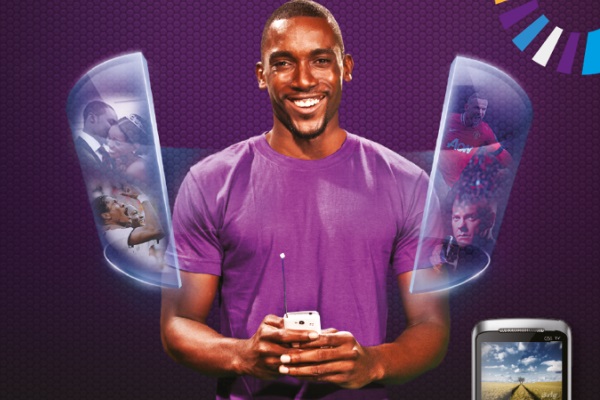
As far back as 1999, I realized that the Japanese had their own phones, the Chinese had their own phones, and the Germans also had their own brands. What was lacking in Africa was that there was no African brand to be able to communicate. This is where I saw the opportunity and in Ghana, in particular, I saw there was huge potential in young people who of course had the potential of being able to repair mobile phones. Once you can repair, it means you have the potential to be able to fix it. Once you can fix it, you should be able to assemble it. What is lacking is the raw material base and the key thing is the raw materials are all over the place. You just need to be able to assemble the raw material and to get the people to act.
In 2002 when we set up RLG Communications as a dot com company, at that time it was for companies. Moving from 2004 to 2006 we went into full operations of mobile phone repairs to create talent in that industry, and in 2008 we launched our own first mobile device under the RLG brand and since then we have increasingly adopted new trends, new modern ways of equipping these guys and also equipping our assembly plants to be able to meet the trends in the telephone industry. Of course we are playing with a lot of brands across the world and we cannot be complacent. We want it to be unique and robust to be able to meet the needs of the people. Also, looking at the content, how do we create content that will also resonate with the people? That has been the thing that we have been driving at. At the end of the day, you can try to be global but you also want to keep the African dream alive so that when you are talking about mobile devices, you can at least identify a brand that exists in Africa. That is what the RLG brand is trying to do – to keep the people talking, but also to remember that it’s an African brand from their own homeland.
What has been the acceptance level of the brand in Africa?
From the onset, people have their own feelings and skepticism. Even before the dot com age, people were afraid of touching a computer. The computer was preserved for a few elite who knew how to touch the computer and the mouse. I remember those days when if you were able to operate a computer, you were seen as a different person in society. But today, computers have been developed for everybody to use and it is not seen in the same way.
Starting to assemble mobile phones in this country, and in Africa in general, was a challenge. The first thing was that it had never happened before so people had their reservations. But we believe in the African dream. We set an agenda to change the mindset of people that everything made in Africa is no good to the fact that times have changed and in Africa, you can compete globally.
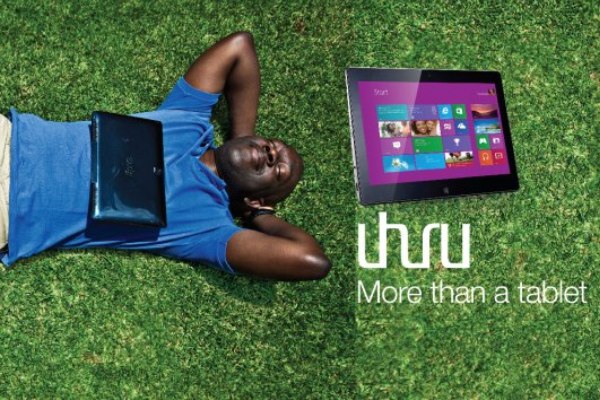
Where are the components coming from? They are coming from the same sources as other brands that also go and outsource. The difference is having the skill to put it together and make it a useable item. That is what we pride ourselves today on being able to do. We are able to assemble computers for various schools and institutions and everybody is using it and it’s a likeable brand.
In terms of internal competitiveness, we are creating jobs for young people and early on they began to understand that this is a brand that needs to stay with us. That is what the people are resonating with because where will our people go if they are not given the necessary equipment, skills and tools? This is what RLG does. It syncs into the local community because whatever is being made locally is what is being used locally and whatever revenue is being raised locally is being consumed locally. It is the same people who benefit from all these things. This is one advantage that we have.
As an African brand we also understand the kind of culture and the apps that the people need. You are not just producing something for other people across the world but you’re also producing something for the Africans. Being an African myself, I understand exactly what the people want. So competitive-wise in terms of brand positioning and the fact that other brands had a lead of 20 to 30 years before we joined this industry, which was about 10 years ago, we still feel that for this journey we have been remarkably able to match our competitors at a certain level. We are looking at how we can use the African ingenuity and this trend of the young population in Africa being able to generate excitement about a brand, because the number one thing is to get the people liking the brand. The number two thing is to be able to test what quality the brand holds for them. Once they are satisfied with the quality and they are also intrigued and they love the brand, then you have the population to yourself.
How do you see the evolution of RLG in 5 years’ time?
RLG should become a household name in Africa. Today, we are looking at how we can use Africa as an assembly block for creating the number one brand in the world. The Chinese have done that with other companies. Once they are number one in China based on the numbers, they are able to compete and they have the same space in terms of revenue and everything. This is what we are focusing our attention on. Africa has so many people, close to 2 billion, so why not have the market to yourself? Once you have that market, it’s enough to use that market to compete globally.
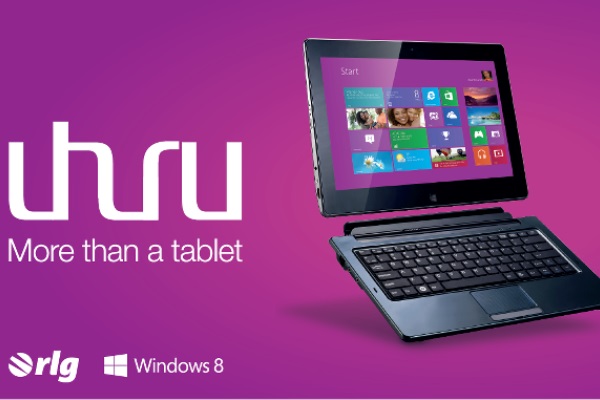
What are the major challenges you are facing to get to the global level?
Definitely it is about the brand building up positioning, which is perception-driven, and how we are able to change that culture. That is what we continue to drive on because people have already made up their minds about what is produced in Africa, so you need to change that perception. That is what will change and drive the results that we are looking for. The quality of production won’t matter if that perception is still wrong. You need to have a dream and you must be able to compete. As much as we know that we are not being complacent, even if we are able to take the market, we still feel that we should be doing better.
How do you sell your phones? Is it in outlets?
We have three sales models, on the consumer side and then on the major wholesale and the enterprise side. The enterprise side is giving jobs to some of the people who have been trained through RLG Mobile Phone Repairs Technology Institute. Some of them are trained in sales and then are set up in various kiosks to sell. We also have major distributors across Africa who take most of the products in bulk. Finally, we have retail outlets which are more or less consumer retail outlets with other vendors who associated with the brand. As we speak, we will be launching our internet sales website on the 15th and this will allow the product to be sold globally, anywhere, anytime.
Now let’s talk about your HOPE City project that has attracted a lot of attention throughout the world. Can you tell us about that?
HOPE City is a 10 billion dollar project and since we launched it, we have never rested; the architects are still working. We changed the location and a few things have changed in terms of the kind of infrastructure. It has been expanded and we now have a much more convenient space because it’s so close to the new site for the airport. We are going to be linking directly to the terminal so you can board directly from HOPE City into the airport. There are a few things that still need to be done and that has set us back a little bit. Our architects have been working around the clock to give us a kind of lifestyle because one of the key things we want to do for HOPE City is to create a lifestyle. It will be a mixed development, although we have ICT as a main objective of bringing in all the top-notch ICT companies in the world to HOPE City in Ghana. We hope these companies will use it as their base to transform the ICT landscape in Africa. We are still on course and hopefully by the end of this year we will have finished with all the architectural drawings and we will begin to start construction.
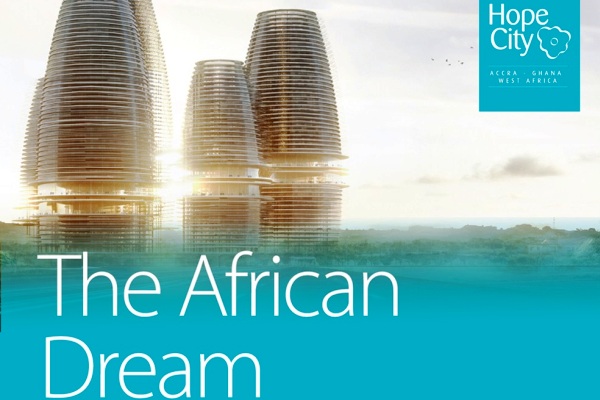
Are you looking for investors or funding?
We have not started a drive for investors yet but clearly since the time HOPE City was launched, many investors have already come on board and there is very high investor interest in HOPE City. We have opened up to take different investors and depending on which of them works well, we are looking at the most strategic investors – this could be one or two or a maximum of ten investors in HOPE City. If we don’t get that, the next thing is to look at an investor drive that will have more strategic investors across the world but still keeping it at a certain minimum investment level, not less than 100 million dollars at a point in time. If that doesn’t work, we will use the stock market to raise more funds. I can tell you clearly that since the day HOPE City was launched, as we speak, we have strategic investors who are already working with us to be able to develop HOPE City without any challenges. Getting investors is not a big issue. We just need to be able to finish with all the drawings and then we’ll be good to go.
Please tell us more about the project.
HOPE City is home office and environment and one of the things we definitely want to do is create an amazing environment for people in the world to begin to look at Africa in a different way. Africa has all the resources; what is lacking is proper research and development. This is one of the key things in HOPE City. Research and development will be a key part that we want ICT companies to develop right here in Ghana.
Because of the byproducts from the petrochemical industry, we have a lot of deposits. Ghana has discovered oil. Where do all these things go? These are things we want to begin to use to create companies for computers, mobile phones and the like. Apart from that, there are all kinds of things that can happen with different devices in the ICT setting. Ghana has an opportunity, sitting in the middle of the world, to be able to export these things across the world. It takes six hours for you to travel out of Ghana and reach so many places. In a maximum of seven to eight hours, you can get to Europe and the U.S., and you can get directly to Asia in 9 hours. This tells you about the unique position that Ghana is in.
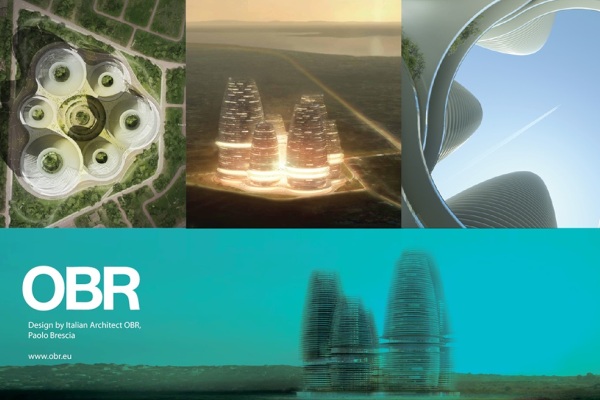
What is lacking is infrastructure to help people understand that you can hop into a city in Ghana, get everything done, and hop out without any challenges. But how will you do that when there’s nothing like HOPE City? HOPE City gives you that opportunity to have your own lifestyle. We are going to have a seven star hotel there, museums, shopping malls, universities, and seven a hospital, so it’s a whole lifestyle that everybody needs, not only because of the caliber of the infrastructure but it will cause everybody to want to be in that kind of city. We have seen it happen across the world and this is something that will be very unique in Africa. We want to be able to drive that kind of economic development for this country.
Since independence, Ghana has been relying on natural resources but now we want to use those resources to make finished products. For example, we have cocoa and we want HOPE City to be a source where research and development can also allow cocoa to be processed to the last finished product and exported directly from Ghana. We have gold and it can be finished to the best possible product here. But how will you attract someone from Switzerland who is making watches with all the best machines, best environment, good shopping and everything, to come and stay in HOPE City and come and stay in Ghana without that congenial environment? HOPE City will give people that environment and that is why you will find that HOPE City is a place for everybody. You want to be able to attract everybody who wants to be able to reduce costs. Africa is the next destination. How do we create an environment whereby we can also reduce costs as we begin to export the things that Africa has exported internationally across the world? This is what HOPE City can do for Africa.
Most people say that this is a governmental responsibility. How closely are you linked with the government?
Government can only give you concessions in terms of tax relief, roads, water, electricity and all those things, but the world today is driven by entrepreneurs. If you want to rely on government to do everything and every infrastructure, then it will be done but it is going to take centuries. This is not the first city that was created in the world. Individuals have created cities across the world and this is one thing that can also happen in Africa. As huge as the project may sound, it is definitely possible to complete it. Yes, you need to partner with the local people and with government in some areas to be able to get access in terms of road network, electricity, and the things needed for basic human consumption but not for infrastructure. Government will not want to go and create a different city out of a city.
This is a private venture in which you see an opportunity that will bring in the resources. Again, this is what entrepreneurship is all about. It is to be able, once you are given that skill and you have that talent, to propel growth in the economy. Entrepreneurship is not just about you but it is also about others and how you can create growth in your own country. That should be the dream of every entrepreneur and for me, I want to see that day that HOPE City begins to be one of the key drivers of this economy. That is one thing that we think that HOPE City can do in the future.
Where do you see your company and HOPE City in five years?
For us, we have a global vision 2020 in which we want to place ourselves as a renowned company in the world. So in five years’ time, it is within our vision scope. We hope we can meet that demand on ourselves within the next five years. Our vision is to be the number one ICT company. HOPE City is just one of the things that when it’s done is just one percent of what we want to do on earth. The rest is to continue to create many more HOPE Cities across the world. I believe in the potential Africa has and it is for us as young people to take that opportunity and change the feelings and the thinking of what Africa has lost all these years.
That is the reason why I believe in the lion and the gazelle. We are already sleeping, we are late, so what we are doing is we are running or else we will be eaten by the lion. If you are the gazelle, you have to run fast. That is what Africa is; Africa is like the gazelle. So, we are looking at making sure that whatever we are doing today, we work hard at it and we run faster than any other continent. This is a continent that has been dealing with poverty and we think this is the only way we can come out of poverty – through hard work and good leadership with magnified entrepreneurship skills across the world.